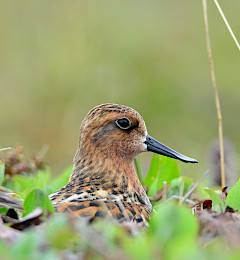
CAFF-IASC Fellowship focussing on AMBI issues announced
2020-04-03
The Conservation of Arctic Flora and Fauna (CAFF) and the International Arctic Science Committee (IASC) welcome Dr. Scott Flemming as the 2020-2021 CAFF-IASC Fellow with the Arctic Migratory Birds Initiative (AMBI).
Dr. Flemming’s Fellowship will focus on increasing knowledge on the prevalence and impacts of plastic contamination on Arctic-breeding shorebird populations. This Fellowship fills an important need of the AMBI program and will contribute to implementation of the AMBI 2019-2023 work plan.
Dr. Flemming will have the opportunity to attend and present this work at several events focussing on the science/policy interface including the CAFF Biennial meeting, the International Symposium in Plastics in the Arctic, and Arctic Science Summit Week in 2021.
The CAFF-IASC Fellowship provides an opportunity for the Fellow to identify a joint area of interest and expertise, participate in, and contribute, to CAFF’s work, and produce at least one peer-reviewed publication and/or deliverable report to the Arctic Council Senior Arctic Officials. The selection process was organized in cooperation with the Association of Polar Early Career Scientists (APECS), who managed the applications and coordinated the work of our independent, volunteer reviewers to evaluate and recommend the highest quality candidates. The final selection was made in consultation with CAFF and IASC.
Scott is generally interested in bird ecology but focuses his research and conservation efforts on shorebirds during their breeding and migration periods. In 2012, he completed his MSc at the University of Otago in Dunedin, New Zealand where he studied the diet and foraging ecology of penguins. During his PhD (2019), at Trent University in Peterborough, Canada, he spent four summers in the eastern Canadian Arctic studying the indirect effects of overabundant geese on tundra-nesting shorebirds. Scott now works as a Shorebird Biologist for Environment and Climate Change Canada in the Pacific Flyway where he conducts populations assessments and studies stop-over ecology.
CAFF and IASC welcome Dr. Flemming and thank APECS for helping to promote the Fellowship and secure the successful candidate.
 Arctic Council Working Group
Arctic Council Working Group 